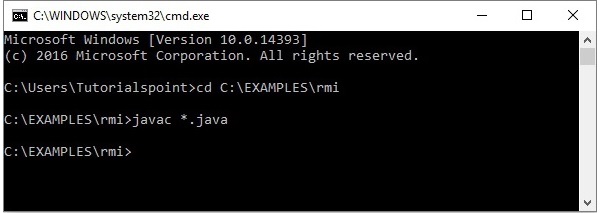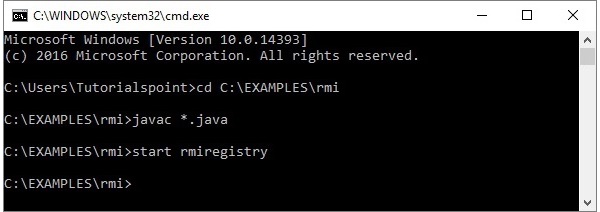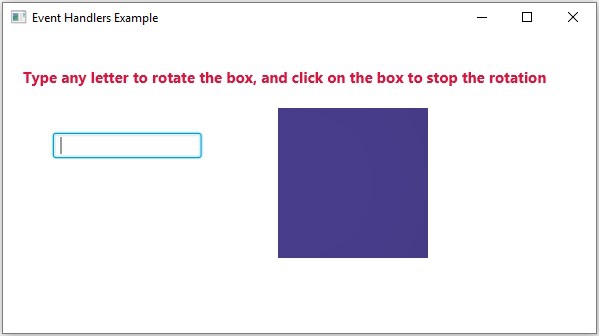Java RMI - GUI 应用程序
在上一章中,我们创建了一个示例 RMI 应用程序。 在本章中,我们将解释如何创建 RMI 应用程序,其中客户端调用显示 GUI 窗口 (JavaFX) 的方法。
定义远程接口
在这里,我们定义了一个名为 Hello 的远程接口,其中包含一个名为 animation() 的方法。
import java.rmi.Remote;
import java.rmi.RemoteException;
// Creating Remote interface for our application
public interface Hello extends Remote {
void animation() throws RemoteException;
}
开发实现类
在此应用程序的实现类(远程对象)中,我们尝试使用 JavaFX 创建一个显示 GUI 内容的窗口。
import javafx.animation.RotateTransition;
import javafx.application.Application;
import javafx.event.EventHandler;
import javafx.scene.Group;
import javafx.scene.PerspectiveCamera;
import javafx.scene.Scene;
import javafx.scene.control.TextField;
import javafx.scene.input.KeyEvent;
import javafx.scene.paint.Color;
import javafx.scene.paint.PhongMaterial;
import javafx.scene.shape.Box;
import javafx.scene.text.Font;
import javafx.scene.text.FontWeight;
import javafx.scene.text.Text;
import javafx.scene.transform.Rotate;
import javafx.stage.Stage;
import javafx.util.Duration;
// Implementing the remote interface
public class FxSample extends Application implements Hello {
@Override
public void start(Stage stage) {
// Drawing a Box
Box box = new Box();
// Setting the properties of the Box
box.setWidth(150.0);
box.setHeight(150.0);
box.setDepth(100.0);
// Setting the position of the box
box.setTranslateX(350);
box.setTranslateY(150);
box.setTranslateZ(50);
// Setting the text
Text text = new Text(
"Type any letter to rotate the box, and click on the box to stop the rotation");
// Setting the font of the text
text.setFont(Font.font(null, FontWeight.BOLD, 15));
// Setting the color of the text
text.setFill(Color.CRIMSON);
// Setting the position of the text
text.setX(20);
text.setY(50);
// Setting the material of the box
PhongMaterial material = new PhongMaterial();
material.setDiffuseColor(Color.DARKSLATEBLUE);
// Setting the diffuse color material to box
box.setMaterial(material);
// Setting the rotation animation to the box
RotateTransition rotateTransition = new RotateTransition();
// Setting the duration for the transition
rotateTransition.setDuration(Duration.millis(1000));
// Setting the node for the transition
rotateTransition.setNode(box);
// Setting the axis of the rotation
rotateTransition.setAxis(Rotate.Y_AXIS);
// Setting the angle of the rotation
rotateTransition.setByAngle(360);
// Setting the cycle count for the transition
rotateTransition.setCycleCount(50);
// Setting auto reverse value to false
rotateTransition.setAutoReverse(false);
// Creating a text filed
TextField textField = new TextField();
// Setting the position of the text field
textField.setLayoutX(50);
textField.setLayoutY(100);
// Handling the key typed event
EventHandler<KeyEvent> eventHandlerTextField = new EventHandler<KeyEvent>() {
@Override
public void handle(KeyEvent event) {
// Playing the animation
rotateTransition.play();
}
};
// Adding an event handler to the text feld
textField.addEventHandler(KeyEvent.KEY_TYPED, eventHandlerTextField);
// Handling the mouse clicked event(on box)
EventHandler<javafx.scene.input.MouseEvent> eventHandlerBox =
new EventHandler<javafx.scene.input.MouseEvent>() {
@Override
public void handle(javafx.scene.input.MouseEvent e) {
rotateTransition.stop();
}
};
// Adding the event handler to the box
box.addEventHandler(javafx.scene.input.MouseEvent.MOUSE_CLICKED, eventHandlerBox);
// Creating a Group object
Group root = new Group(box, textField, text);
// Creating a scene object
Scene scene = new Scene(root, 600, 300);
// Setting camera
PerspectiveCamera camera = new PerspectiveCamera(false);
camera.setTranslateX(0);
camera.setTranslateY(0);
camera.setTranslateZ(0);
scene.setCamera(camera);
// Setting title to the Stage
stage.setTitle("Event Handlers Example");
// Adding scene to the stage
stage.setScene(scene);
// Displaying the contents of the stage
stage.show();
}
// Implementing the interface method
public void animation() {
launch();
}
}
服务器程序
RMI服务器程序应该实现远程接口或扩展实现类。 在这里,我们应该创建一个远程对象并将其绑定到RMIregistry。
以下是该应用程序的服务器程序。 在这里,我们将扩展上面创建的类,创建一个远程对象,并使用绑定名称 hello 将其注册到 RMI 注册表。
import java.rmi.registry.Registry;
import java.rmi.registry.LocateRegistry;
import java.rmi.RemoteException;
import java.rmi.server.UnicastRemoteObject;
public class Server extends FxSample {
public Server() {}
public static void main(String args[]) {
try {
// Instantiating the implementation class
FxSample obj = new FxSample();
// Exporting the object of implementation class
// (here we are exporting the remote object to the stub)
Hello stub = (Hello) UnicastRemoteObject.exportObject(obj, 0);
// Binding the remote object (stub) in the registry
Registry registry = LocateRegistry.getRegistry();
registry.bind("Hello", stub);
System.err.println("Server ready");
} catch (Exception e) {
System.err.println("Server exception: " + e.toString());
e.printStackTrace();
}
}
}
客户端程序
以下是该应用程序的客户端程序。 在这里,我们获取远程对象并调用其名为 animation() 的方法。
import java.rmi.registry.LocateRegistry;
import java.rmi.registry.Registry;
public class Client {
private Client() {}
public static void main(String[] args) {
try {
// Getting the registry
Registry registry = LocateRegistry.getRegistry(null);
// Looking up the registry for the remote object
Hello stub = (Hello) registry.lookup("Hello");
// Calling the remote method using the obtained object
stub.animation();
System.out.println("Remote method invoked");
} catch (Exception e) {
System.err.println("Client exception: " + e.toString());
e.printStackTrace();
}
}
}
运行示例的步骤
以下是运行 RMI 示例的步骤。
步骤 1 − 打开存储所有程序的文件夹并编译所有 Java 文件,如下所示。
Javac *.java

第 2 步 − 使用以下命令启动 rmi 注册表。
start rmiregistry

这将在单独的窗口上启动 rmi 注册表,如下所示。

第 3 步 − 运行服务器类文件,如下所示。
Java Server

第 4 步 − 运行客户端类文件,如下所示。
java Client

验证 − 一旦启动客户端,您就会在服务器中看到以下输出。



